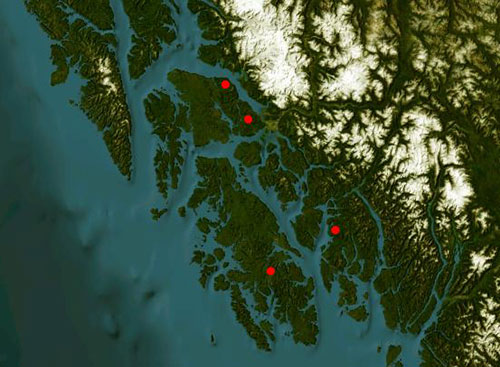(SitNews) Ketchikan, Alaska – The U.S. District Court in Anchorage issued a decision Friday on what is commonly known as the Islands Wolf lawsuit. Friday’s decision has now, for the second time, stopped four Tongass National Forest logging projects. Greenpeace and Cascadia Wildlands have been litigating these projects since 2008.
Friday’s order from the District Court says, “this Court finds … the Forest Service still has not adequately explained its decision to approve the four logging projects”. The projects halted are the Traitors Cove project near Ketchikan, Soda Nick near Hydaburg, and the Scott Peak and Overlook projects near Petersburg. This matter was remanded to the United States Forest Service to make further findings and determinations consistent with the Court’s decision.

Map showing the locations of the four logging projects.
Map courtesy Sitka Greenpeace Field Office
“We welcome the District Court’s findings that the Forest Service’s justification for timber sales near Petersburg, Ketchikan, and Hydaburg are inadequate and illegal,” said Larry Edwards, Greenpeace Forest Campaigner. “The logging plans did not take into account that these areas are already struggling to sustain a high enough deer population to allow timber sales, while still meeting the requirement to provide enough deer to sustain wolves and deer hunters. Further timber sales will only worsen this to the point where the existence of wolves is endangered and subsistence hunting has to be limited.”
Legal opposition to the Forest Service’s proposed timber sales has been based on a model the agency uses for determining whether old-growth forest habitat has the ability to sustain deer populations beyond what is needed to support Alexander Archipelago wolf populations and subsistence deer hunting, so that forest could then be sacrificed to logging, a long-term loss of old-growth habitat. The Tongass Forest Plan – the official standards the Forest Service is obligated to follow in planning timber sales – specifies a winter habitat capacity for 18 deer per square mile, is the threshold for making this determination. The areas in which the Forest Service planned the four projects already fall far short of that requirement.
Gabe Scott, Cascadia Wildlands’ representative in Alaska, said “In answering our previous challenges to these timber sale projects the Forest Service corrected its modeling errors, and then came up with the same failing deer model scores we had been predicting for years in this case, instead of its previous high numbers. The agency covered over this outcome by applying the 2008 Forest Plan to the modeling results, whereas the projects had been planned and decided under the 1997 Forest Plan. We had no choice but to take this back to court.”
The court found the agency’s approach to be illegal, saying “The Forest Service cannot have it both ways.” It determined that “… the 1997 and 2008 Forest Plans … are not identical and therefore they are not interchangeable in evaluating the Forest Service’s decisions …,” and that “… retroactive application of an amended plan has expressly been rejected by the Ninth Circuit.”
The Forest Service now has a second chance that includes two options to correct the deficiency. The second chance is one of two optional paths the plaintiffs asked the court to take in its decision. Under the court decision, either the remedial remand work must be redone by reevaluating the corrected deer model results under the framework of the 1997 Tongass Forest Plan, or the agency must formally remake the decisions for the four timber projects under the 2008 Forest Plan.
“The Forest Service has lots of work to do if it still wants to pursue these projects,” said Scott. “It also has the option to simply cancel the projects though, and that really makes the most sense given the limited capacity for these forest areas to sustain adequate deer populations under the Forest Service’s model.”
This was the second legal action of the week affecting the Alexander Archipelago wolf. On Monday the Center for Biological Diversity, Greenpeace and The Boat Company achieved a settlement with the U.S. Fish & Wildlife Service to advance the agency’s decision date for deciding whether to list the species as threatened or endangered in Southeast Alaska (including the Tongass National Forest) – the only place where it exists – under the Endangered Species Act (ESA).
The three organizations sued the U.S. Fish & Wildlife Service earlier this year because it had planned to delay its decision on the listing at the end of 2017 at the earliest. The ESA requires a decision within one year of when a petition-to-list is filed. The settlement sets the deadline as the last day of 2015.
Greenpeace’s Edwards said, “This is an important settlement, because now the decision on whether or not to list the Alexander Archipelago wolf as threatened or endangered will be made well before the Forest Service’s next amendments to the Tongass Forest Plan, which will be finalized in August 2016.”
Greenpeace and Cascadia Wildlands won a 9th Circuit Court of Appeals order in 2011, directing the district court to remand the Forest Service’s decisions on the projects. The remand required the agency to explain what apparent plain errors in the way it applied a timber sale planning tool known as the deer model.
Attorneys representing Greenpeace and Cascadia Wildlands are Chris Winter of Crag Law Center (Portland, Oregon) and René Voss of California. The McIntosh Foundation and The Boat Company, which does eco-tours in Southeast Alaska, have supported the effort.
Edited by Mary Kauffman, SitNews
On the Web
09/26/14 ORDER REGARDING MOTION TO ENFORCE MANDATE ON REMAND
http://www.sitnews.us/0914News/092714/0914_USDistrictCourt092614.pdf
Source of News:
Greenpeace – Alaska
www.greenpeace.orgCascadia Wildlands – Alaska
http://www.cascwild.org
